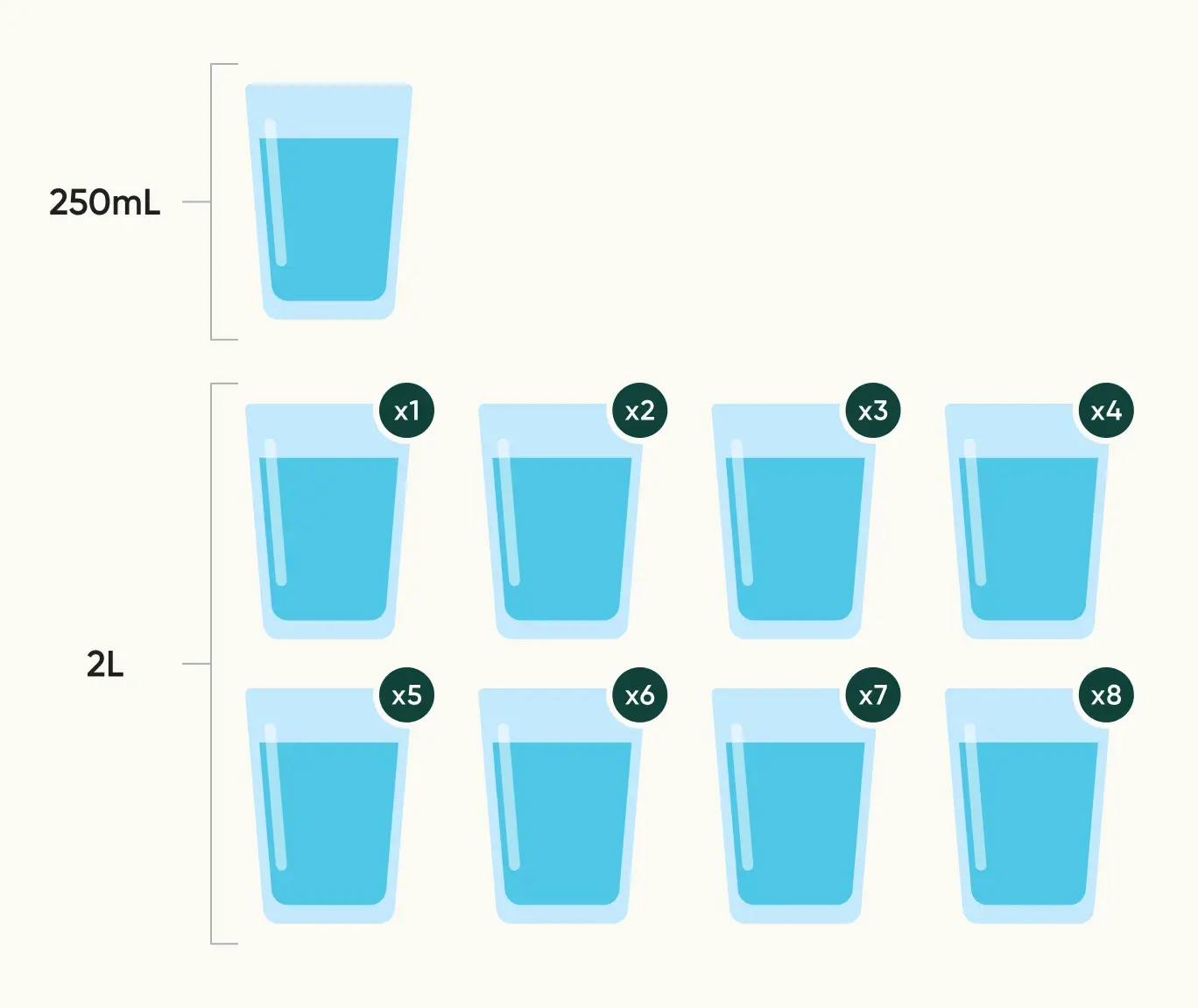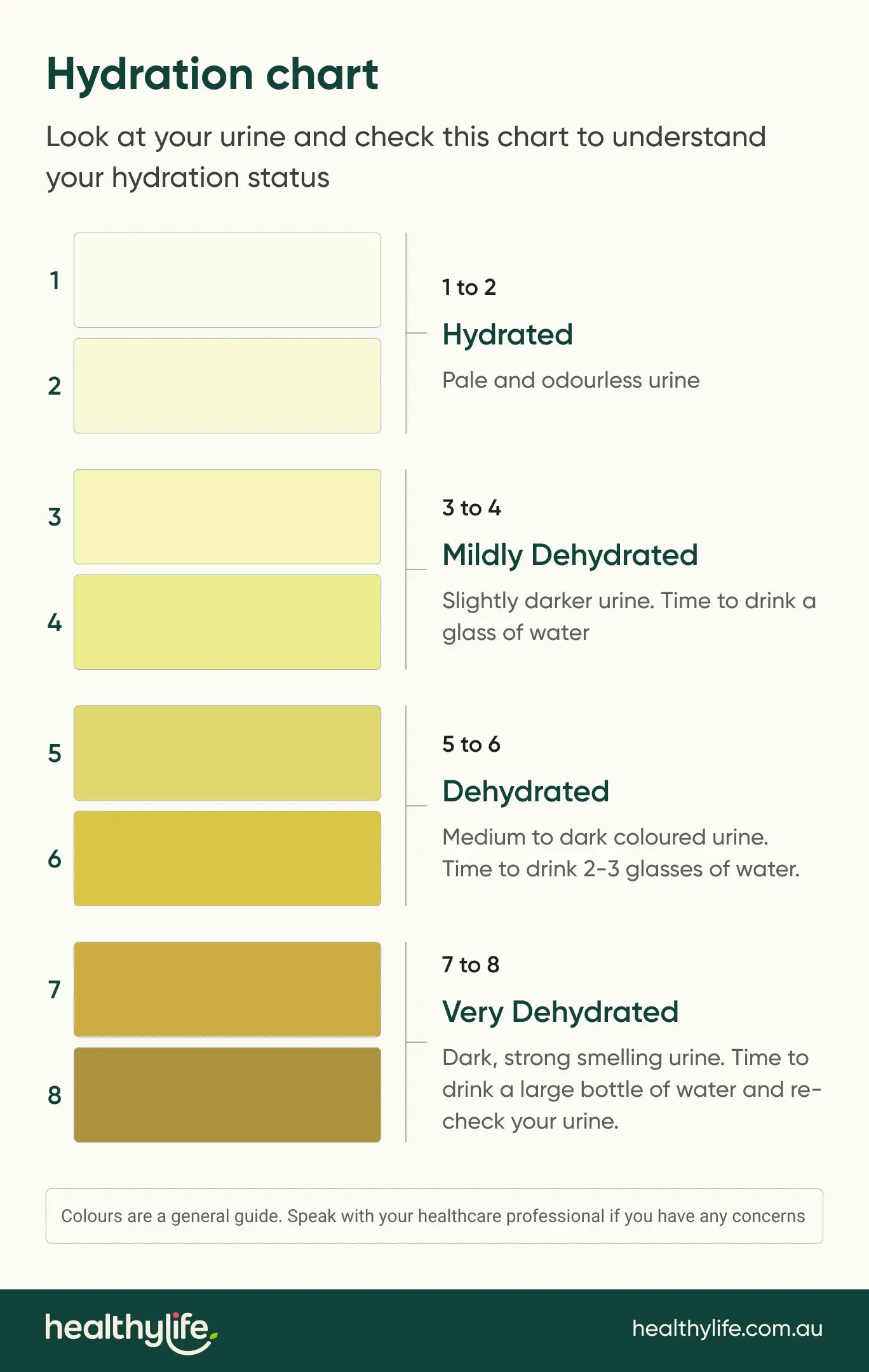Do I really need 8 cups of water per day?

Most of us know that hydration is an important part of good health, especially since two-thirds of the body is made up of water. You’ve probably also heard that you should be drinking 8 glasses of water per day. Just like no shoe fits all, the 8 glasses rule doesn’t fit all. But there is some merit to it—let’s break it down.
Where did 8 cups of water a day come from?
Government health guidelines recommend that adults drink around 2 litres of water per day as a general guide. If we use a standard cup size of 250mL, this is probably where the common “8 cups a day” saying comes from. For some people, 8 glasses of water might be a perfect amount, but for others it might not be enough.

8 cups of water equals 2L of water per day as a general guide
How much water should you drink each day?
Water requirements might change day to day and will depend on many factors such as:
- The outside temperature. For example, you may need to drink more water during the summer months
- How much you’ve exercised
- If you are pregnant or breastfeeding
- Your own unique body and needs
Thanks to your kidneys, your body has a basic instinct to tell you how much water you actually need and also maintains balance by getting rid of any that you don't need.
How can I drink enough water?
Sipping on water throughout the day, using 8 cups as a rough guide, is an easy and practical way to ensure you’re getting enough water. More importantly, drink before you feel thirsty, as thirst is already a sign of mild dehydration. If you’re exercising or it’s a hot day, be sure to drink extra water to make up for losing more fluid.
Excessive thirst and having to urinate more frequently than usual may also be a sign of diabetes for some individuals. Chat to your healthcare professional if you’re concerned about this.
How do I know if I am hydrated?
If you want to check your hydration status, there’s an easy, not-so-glamorous way: check the colour of your wee! You should aim for a pale coloured urine (like the colour of lemonade), which is a good sign you are well hydrated. If your wee is amber or burnt orange coloured, it’s time to drink more water.
Remember that sometimes the colour of your urine may be affected by other factors (such as some medications or supplements) - so always speak to your healthcare professional if you’re not sure.

Look at the colour of your urine to check your hydration status
Benefits of drinking enough water
Water is used by our cells, tissues, and organs for digestion, circulation, absorbing nutrients and regulating temperature. We lose water (and other salts) through everyday body processes like sweating and breathing so it’s important to replenish this.
Can you hydrate using other drinks?
The dietary guidelines recommend regular, still water should be our main drink of choice. Sometimes you might need more variety or may require electrolytes for faster rehydration. In that case, try:
- Herbal teas, sparkling water or milk are healthier alternatives to soft drinks and energy drinks.
- Oral rehydration or electrolyte drinks may be helpful for hydrating after illness, travelling or excessive sweating. Hypotonic solutions are perfectly balanced for your hydration needs.
Can you drink too much water?
Drinking more water than your body needs can lead to hyponatremia (where the level of salt in the blood becomes too diluted). This can happen when babies have highly diluted formula or potentially when drinking too much water while exercising. While quite rare, it’s important to note and worth discussing with your healthcare professional if you have any concerns.
Related articles:
- Are you drinking enough water? 7 signs to find out
- Tap water: is it safe to drink in Australia?
- How to drink water if you don't like it
This article is for informational purposes only and does not provide medical advice, diagnosis, or treatment. Any information published on this website or by this brand is not intended as a substitute for medical advice. If you have any concerns or questions about your health you should consult with a health professional.
